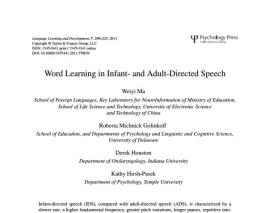I had to stop myself mid-sentence. After an hour or two of playing with my 15 month old daughter, there was a knock on the door. I opened it to find our neighbor. My “Hello!” came out as if I were still speaking to my daughter – in a drawn out fashion, with an exaggerated pause between the two syllables and a heavy emphasis on the “o” at the end of the word. To my daughter, that would have been fine, but this wasn’t her.
Since then, I’ve taken time to recover from the embarrassment and also to evaluate the way I speak with my daughter. A reoccurring question was, “Why do I speak this way to her?” Or, in other words, “What is an infant supposed to gain from modification of the English language spoken to her?”
There is ample research on the subject and a variety of opinions revolving around various intricacies of baby talk. Terminology for the subject includes “baby talk,” “parentese,” “motherese,” “child-directed speech,” “infant-directed speech,” and others. I’ll stick with infant-directed speech for now.
By way of definition, infant directed speech is classified as the non-standard speech used to speak to a child. This speech carries modified intonations that are higher in pitch and also includes emphasized pronunciation. In addition, there is an increase in the distances between vowels (as it was in my “neighbor-directed speech”). We’ve all heard variations of this type of speech at times and some people even use it to talk to pets, to belittle other adults, and to flirt.
Back to the meat of the discussion, what are the benefits? And, by the way, there better be some benefits, because any mom or dad has sacrificed a bit looking and sounding totally ridiculous all in an effort to help an innocent, precious little one understand, learn, and communicate.
Research done by the Taylor & Francis Group and published by Psychology Press compared infant-directed speech to the standard adult-directed speech and tested word learning ability in infants. Two age groups were observed: 21 months and 27 months.
Their findings introduced a very important distinction in how children can benefit from infant-directed speech. Not all children benefit the same. The 21-month-olds were only able to reliably learn words under the influence of infant-directed speech. Without it, their word learning was unreliable. However, the 27-month-olds were able to reliably learn the words through adult-directed speech and didn’t need infant-directed speech to improve word acquisition. The conclusion drawn is that infant-directed speech does in fact facilitate improved word mapping in the beginning of word acquisition, but its influence wanes over time as language development proceeds. The exact timing of this development will vary by child, but in the study, the 27-month-old babies received little to no benefit from infant-directed speech. In a word, they had outgrown the need for it.
So here’s the bottom line. Infant-directed speech will improve a baby’s word learning during the weeks and months leading up to “the beginning of word acquisition.” Parents need to be aware enough of their baby’s word learning abilities to determine when that beginning is effectively underway. As parents recognize this ability beginning to develop, they can gradually revert their infant-directed speech back to the standard speech used among adults.
This understanding will ease burdens on parents and children (and neighbors) and will foster improved development of language, emotions, and relationships.


Leave a Reply